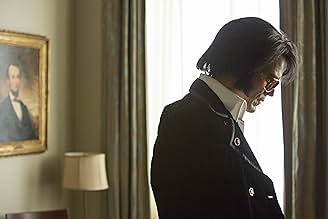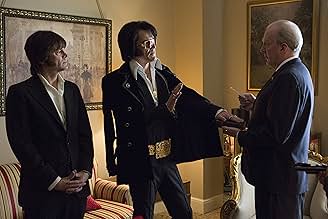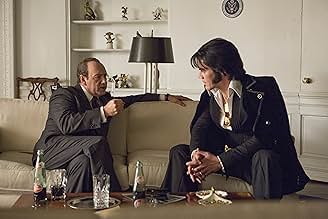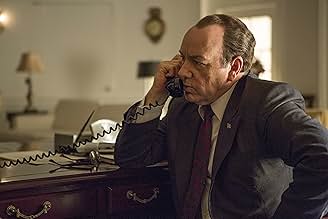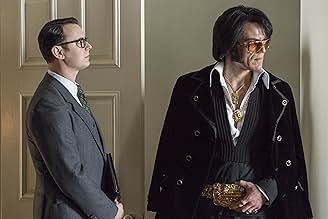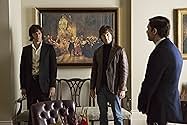ÉVALUATION IMDb
6,3/10
15 k
MA NOTE
Ajouter une intrigue dans votre langueThe untold true story behind the meeting between Elvis Presley, the King of Rock 'n Roll, and President Richard Nixon, resulting in this revealing, yet humorous moment immortalized in the mo... Tout lireThe untold true story behind the meeting between Elvis Presley, the King of Rock 'n Roll, and President Richard Nixon, resulting in this revealing, yet humorous moment immortalized in the most requested photograph in the National Archives.The untold true story behind the meeting between Elvis Presley, the King of Rock 'n Roll, and President Richard Nixon, resulting in this revealing, yet humorous moment immortalized in the most requested photograph in the National Archives.
- Prix
- 2 victoires et 4 nominations au total
Skye Peters
- Stewardess #3
- (as Skye Forsyth-Peters)
Histoire
Le saviez-vous
- AnecdotesBased on a true story. In December 1970, Elvis Presley met President Richard Nixon, who appointed Presley as an honorary DEA agent.
- GaffesIn the Oval Office: The Dr Pepper bottles logos are ten years ahead of their time.
- ConnexionsFeatured in Vecherniy Urgant: Olga Pogodina/Andrey Chernyshov (2016)
- Bandes originalesHold On I'm Coming
Written by Isaac Hayes & David Porter (as Dave Porter)
Performed by Sam & Dave
Courtesy of Atlantic Recording Corp.
By Arrangement with Warner Music Group Film & TV Licensing
Commentaire en vedette
Elvis & Nixon very much relies on the performances of Kevin Spacey and Michael Shannon, and thrives on what they bring to the eventual meeting between Elvis Presley and Richard Nixon. The movie is based on a true story that's better documented than is suggested here. Making Elvis & Nixon fanciful and fabricated in spite of how unusual this event actually was. Which is fine, because most biopics and fact-based dramas exist on creative licence. Although this is a movie that could have been equally successful had more of the facts been more closely adhered to in the script.
What matters, however, is how interesting and appealing Spacey and Shannon make the film's central characters. Although we find a way into their respective worlds by way of Colin Hanks' "Bud Krogh" and Alex Pettyfer's "Jerry Schilling." Schilling in particular, whose fingerprints are evident throughout the movie ("me and a guy named Elvis" is a line of dialogue at one point," this being the title of Schilling's autobiography) and who acts almost like an audience surrogate.
Schilling, who we first encounter working at Paramount Studios, is encouraged back "in" with Elvis as we are taken on a journey to the White House that's foreshadowed in our first glimpse of the man, himself. Watching Dr. Strangelove on one of his three televisions in a nicely recreated Graceland television room. But this isn't just a reference to one of Elvis's favourite movies, the scene from Kubrick's film that's used here foreshadows the nature and tone of his meeting with Nixon. No fighting in the War Room? How about karate in the Oval Office?!
Along the way, Shannon, who doesn't resemble Elvis but embodies the role with gestures small and grand, speech patterns, glances and a physicality that's undoubtedly been studied, becomes believable as Elvis. This isn't a caricature. The caricature is what Elvis actually became. Which is appreciated in the way he expresses concerns about his identity to Schilling, and in a touching monologue about his stillborn brother, Jessie Garon.
Shannon finds genuine nuance and pathos in Elvis. Although Liza Johnson's direction doesn't quite allow the excitement and elation of meeting Nixon to be juxtaposed with crushing lows or an indication of how such ultimately manifested itself in Elvis over subsequent years. We see him disappointed when things aren't going his way and when meeting Nixon seems lost at one point, but standing slumped and resigned isn't enough to encourage deeper sympathy for Elvis. Whilst the ultimate irony was missed in failing to depict his own problems with drugs.
As Nixon, Spacey also finds nuance and manages to make the former President larger than life from behind a desk and despite his reservations about meeting Elvis, and just about everything else. He has less to work with than Shannon, but Spacey gets Nixon just right and manages to refrain from caricature whilst exploring amusing traits and mannerisms. Both physical and psychological.
Beyond the two central characters, the screenplay and some variable stock footage encourages political and cultural touch-points that aren't dwelled upon. Although it's clear that Nixon isn't adverse to finding good PR opportunities or impressing his daughters. A trend that crops up throughout the movie, with Elvis using such as a free pass at his convenience. For him, good PR opportunities are also valuable.
In many ways, however, Elvis and Nixon suffer the same issues with loneliness, isolation and concerns about their image. Which is something Elvis is portrayed as being more in touch with than Nixon, who laments about not looking like a Kennedy and tries to boost his ego by asking Krogh if he could take Elvis in a fight. Elvis, on the other hand, is aware of his image and the performance that's required just to be Elvis Presley. Which is something that was also expressed by Michelle Williams' Marilyn Monroe in Simon Curtis' 2011 film, My Week With Marilyn.
By the time Elvis and Nixon eventually meet, both characters have been fully established, and whilst the vignettes along the way are both funny and geared towards comedy, some miss the mark completely. Such as a clandestine meeting between Elvis and Nixon's aides, that hints towards All the Presidents Men but plays more like a parents' meeting. Although Elvis's visit to a doughnut shop that's populated by a streetwise and vocal black clientele shows him comfortable with all walks of life and able to keep his ego in check.
This is in stark contrast to his meeting with Nixon, where Elvis is far from humbled and tries to impress upon the President with bizarre notions and one-upmanship. In one shot, Elvis seems to dwarf Nixon in the way both men are framed. But Spacey plays the President with quick wit and more than a little bemusement at what's in front of him. He sees what see in Elvis. But can't see that he's playing him for his own gain.
Unfortunately, the pacing and editing falters during the final act, with Schilling's personal dilemma of getting home to his girlfriend breaking the meeting up at one point. Whilst Evan Peters and Johnny Knoxville's Dwight Chapin and Sonny West, respectively, linger in thankless roles.
What's also noticeable is a lack of Elvis's music in the film's soundtrack, which is quite good regardless. Although Ed Shearmur's score is transparent and obtrusive at times. But Elvis & Nixon isn't about Elvis and his music. It's about a quest to find something fulfilling in his life. Which is expressed with profound sincerity in the way Michael Shannon plays Elvis. Getting under his skin and contrasting charisma and personality with a pensive nature and moments of uncertainty. It's a warm, affectionate and earnest performance in a movie that's skewed towards comedy, but has an acute understating of not only Elvis and Nixon, but celebrity and politics.
What matters, however, is how interesting and appealing Spacey and Shannon make the film's central characters. Although we find a way into their respective worlds by way of Colin Hanks' "Bud Krogh" and Alex Pettyfer's "Jerry Schilling." Schilling in particular, whose fingerprints are evident throughout the movie ("me and a guy named Elvis" is a line of dialogue at one point," this being the title of Schilling's autobiography) and who acts almost like an audience surrogate.
Schilling, who we first encounter working at Paramount Studios, is encouraged back "in" with Elvis as we are taken on a journey to the White House that's foreshadowed in our first glimpse of the man, himself. Watching Dr. Strangelove on one of his three televisions in a nicely recreated Graceland television room. But this isn't just a reference to one of Elvis's favourite movies, the scene from Kubrick's film that's used here foreshadows the nature and tone of his meeting with Nixon. No fighting in the War Room? How about karate in the Oval Office?!
Along the way, Shannon, who doesn't resemble Elvis but embodies the role with gestures small and grand, speech patterns, glances and a physicality that's undoubtedly been studied, becomes believable as Elvis. This isn't a caricature. The caricature is what Elvis actually became. Which is appreciated in the way he expresses concerns about his identity to Schilling, and in a touching monologue about his stillborn brother, Jessie Garon.
Shannon finds genuine nuance and pathos in Elvis. Although Liza Johnson's direction doesn't quite allow the excitement and elation of meeting Nixon to be juxtaposed with crushing lows or an indication of how such ultimately manifested itself in Elvis over subsequent years. We see him disappointed when things aren't going his way and when meeting Nixon seems lost at one point, but standing slumped and resigned isn't enough to encourage deeper sympathy for Elvis. Whilst the ultimate irony was missed in failing to depict his own problems with drugs.
As Nixon, Spacey also finds nuance and manages to make the former President larger than life from behind a desk and despite his reservations about meeting Elvis, and just about everything else. He has less to work with than Shannon, but Spacey gets Nixon just right and manages to refrain from caricature whilst exploring amusing traits and mannerisms. Both physical and psychological.
Beyond the two central characters, the screenplay and some variable stock footage encourages political and cultural touch-points that aren't dwelled upon. Although it's clear that Nixon isn't adverse to finding good PR opportunities or impressing his daughters. A trend that crops up throughout the movie, with Elvis using such as a free pass at his convenience. For him, good PR opportunities are also valuable.
In many ways, however, Elvis and Nixon suffer the same issues with loneliness, isolation and concerns about their image. Which is something Elvis is portrayed as being more in touch with than Nixon, who laments about not looking like a Kennedy and tries to boost his ego by asking Krogh if he could take Elvis in a fight. Elvis, on the other hand, is aware of his image and the performance that's required just to be Elvis Presley. Which is something that was also expressed by Michelle Williams' Marilyn Monroe in Simon Curtis' 2011 film, My Week With Marilyn.
By the time Elvis and Nixon eventually meet, both characters have been fully established, and whilst the vignettes along the way are both funny and geared towards comedy, some miss the mark completely. Such as a clandestine meeting between Elvis and Nixon's aides, that hints towards All the Presidents Men but plays more like a parents' meeting. Although Elvis's visit to a doughnut shop that's populated by a streetwise and vocal black clientele shows him comfortable with all walks of life and able to keep his ego in check.
This is in stark contrast to his meeting with Nixon, where Elvis is far from humbled and tries to impress upon the President with bizarre notions and one-upmanship. In one shot, Elvis seems to dwarf Nixon in the way both men are framed. But Spacey plays the President with quick wit and more than a little bemusement at what's in front of him. He sees what see in Elvis. But can't see that he's playing him for his own gain.
Unfortunately, the pacing and editing falters during the final act, with Schilling's personal dilemma of getting home to his girlfriend breaking the meeting up at one point. Whilst Evan Peters and Johnny Knoxville's Dwight Chapin and Sonny West, respectively, linger in thankless roles.
What's also noticeable is a lack of Elvis's music in the film's soundtrack, which is quite good regardless. Although Ed Shearmur's score is transparent and obtrusive at times. But Elvis & Nixon isn't about Elvis and his music. It's about a quest to find something fulfilling in his life. Which is expressed with profound sincerity in the way Michael Shannon plays Elvis. Getting under his skin and contrasting charisma and personality with a pensive nature and moments of uncertainty. It's a warm, affectionate and earnest performance in a movie that's skewed towards comedy, but has an acute understating of not only Elvis and Nixon, but celebrity and politics.
- JohnnyWeissmuller
- 7 juill. 2016
- Lien permanent
Meilleurs choix
Connectez-vous pour évaluer et surveiller les recommandations personnalisées
- How long is Elvis & Nixon?Propulsé par Alexa
Détails
- Date de sortie
- Pays d’origine
- Sites officiels
- Langues
- Aussi connu sous le nom de
- Elvis and Nixon
- Lieux de tournage
- sociétés de production
- Consultez plus de crédits d'entreprise sur IMDbPro
Box-office
- Brut – États-Unis et Canada
- 1 055 287 $ US
- Fin de semaine d'ouverture – États-Unis et Canada
- 466 447 $ US
- 24 avr. 2016
- Brut – à l'échelle mondiale
- 1 798 432 $ US
- Durée1 heure 26 minutes
- Couleur
- Rapport de forme
- 2.35 : 1
Contribuer à cette page
Suggérer une modification ou ajouter du contenu manquant

Lacune principale
By what name was Elvis & Nixon (2016) officially released in India in English?
Répondre






